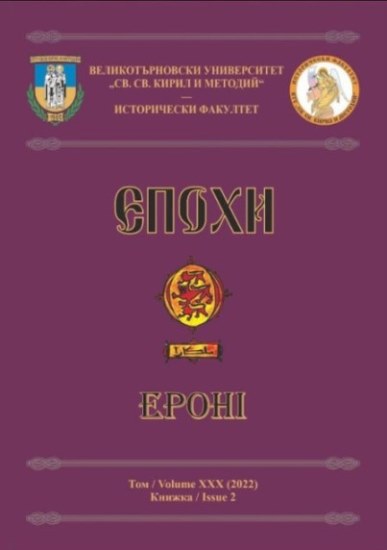Repression of Bessarabian Bulgarians by Russian Authorities during World War I (1914–1917)
Repression of Bessarabian Bulgarians by Russian Authorities during World War I (1914–1917)
Author(s): Artur LeşcuSubject(s): History, Social Sciences, Sociology, Local History / Microhistory, Military history, Recent History (1900 till today), Pre-WW I & WW I (1900 -1919), Ethnic Minorities Studies
Published by: Великотърновски университет „Св. св. Кирил и Методий”
Keywords: power; legislation; gendarmes; army; crime; reprisals; government; Russian Empire; Bessarabia
Summary/Abstract: Based on the original documentary material collected by the author in the National Archives of the Republic of Moldova, an attempt has been made to investigate some unknown aspects of the struggle of Bessarabian Bulgarians against the tsarist policy of assimilation during the First World War. At the beginning of the 20th century, the Bulgarians ranked fifth in terms of population in Bessarabia – a province annexed to the Russian Empire in 1812. In all these years, they preserved their language, culture, and national traditions, transforming the Alexander III Boys’ Gymnasium in Bolgrad into a true centre of national culture. Many Bessarabian Bulgarians played an important role in the history of Bulgaria, holding positions of responsibility in the Bulgarian state. Some of them were the Prime Minister of Bulgaria Aleksandar Malinov, the Minister of War Danail Nikolaev, the Mayor of Sofia Martin Todorov and his brother General Georgi Todorov, and General Ivan Kolev. Despite this fact, and in contradiction with Russian historical mythology about special relations privileged with Bulgarians, the Russian authorities treated them equally with other national minorities, exposing them to forced assimilation, deportations, expulsions, repressions, and arrests of representatives of the Bulgarian national movement in the Russian Empire.
Journal: Епохи
- Issue Year: XXX/2022
- Issue No: 2
- Page Range: 313-317
- Page Count: 5
- Language: English

